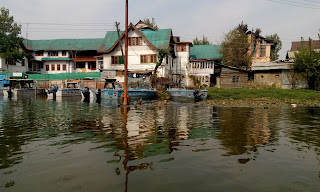At Amritsar, Punjab, we all got a week off from work, after a successful deployment. I decided Kashmir was not too far off to warrant a quick visit. The same evening after work, I packed my bags and flew off to Srinagar. I chose air travel to reduce the journey time and fatigue, as I figured out anyway I would be travelling by land on my way back.
The journey was uneventful, except that foreigners alighting at Srinagar airport had to go through a separate procedure and made to sign a a register and other formalities in spite of having checked in at an Indian airport earlier. No chances being taken I guess, in this disturbed land.
As soon as I alighted from the airport complex I was greeted by a light chill and a gust of fresh air that smelled of pine trees.
I was surprised to find that I was not badgered at the airport by the usual crowd of taxi drivers you usually find at international airports. It was November and off season for the tourism industry and not many people were visiting after the devastating floods caused by the overfilling of the Jhelum river that runs through the middle of Srinagar city.
I quickly located a run down rickety state transport owned van parked discreetly in a corner just outside the airport gates. I was lucky to not having to hire a taxi (who as usual charge exorbitant rates at airports), but the bus fare was still very high, almost double the normal rate. I argued with the conductor but he showed me the stamped bus ticket endorsed by J&K Public Transport. "Get down anywhere...", he said. "Same fare".
I had no clue where to get down to search for decent boarding, so I asked a Sardarji, probably an inter-state businessman, sitting opposite me if he had any clue as to where I could spend the night without spending a fortune. He recommended getting down at Lal Chowk, just before the last stop.
"Plenty of hotels there", he said. "So you might find what you are looking for".
"By the way", he added."I noticed there were not many people on the flight from Amritsar.. right?"
I nodded.
As the early morning sun rose, warming the air a tad bit, I noticed young Kashmiri women on the street. Their famed beauty of fair skin and rosy cheeks was evident but what surprised we that they being Muslim, they still did not adhere to the hijab or the purdah. Modern Muslims, I guessed.
The other thing that I noticed was that Srinagar seemed to be living in another age, a larger copy of what I had seen at hill stations such as Mussoorie and later at Dharamashala. The buildings were very modest, some built of wood and no notable structures that struck out as modern. Was the rustic charm being preserved for tourists?
The evidence that all was not well in Kashmir was the presence of Indian Army soldiers. They were everywhere, toting machine guns, eyeing everybody and everything suspiciously. But they paid no heed to our bus. Tourists didn't figure in their list of people to be questioned, especially one just out of the airport to the government run Tourist Center? Among those uniformed militia I could recognize some hefty men from my native Kerala, with bushy mustaches and beer induced ruddy cheeks.
I got down at Lal Chowk, when the bus driver called out the stop aloud.
I got down and made my way to one of the better looking hotels that didn't look too expensive. Lal Chowk wore a look of utter destruction and desolation. There was hardly anybody on the streets, except for a few businessmen selling cheap jackets to a bunch of young Kashmiri men who were probably preparing for the harsh winter ahead.
There were huge piles of trash and flotsam on the streets, reminders of the earlier floods, still not yet cleared after nearly a month; and repair work was in progress in most of the shops, especially the basements which were completely destroyed along with the stored merchandise by the flood waters from the Jhelum river. The frustration was evident when I met a couple of Kashmiris later on my trip. Srinagar was already a city under siege and the flooding of the Jhelum had only added salt to the festering wounds. . Lal Chowk would be famous a few months later for the arbitrary search and detain operations by army men of youth residing in and around Lal Chowk,
I noticed temporary structures around street corners where lone army men were on the lookout. It seemed the army men outnumbered the locals, which was something echoed later by many of the Kashmiris I met later.
I decided to have a cuppa tea, I bought some cigarettes, found a cheap tea stall in an alley and had tea with sweet Kashmiri bread. I was a bit apprehensive about so many militiamen on the streets, so before lighting the cigarette, I asked the cigarette seller whether it was safe to smoke on the streets. "Of course!", he replied, and I noticed he was doing brisk business as it was Diwali day, all government offices were closed and most other business was at a standstill.
My next trip was to Dal Lake, since it is bang in the middle of Srinagar. I will leave that for another post, to talk not about the Shikara (traditional Kashmiri row boat operated by a single boats man- the Shikarawallah) ride, but what the Shikarawallah had to say on the one and half hour ride.


